
views
Director: Eliane Raheb
At one point in Eliane Raheb's documentary 'Sleepless Nights', Assaad Shaftari tells her that she seems to be looking for a journalistic scoop. This is when the filmmaker had asked him a question about Israeli involvement in Lebanon's civil war which Shaftari cannot answer truthfully. Go in-depth he tells her. Ask me why did we need Israeli help, and I would be able to talk for five hours, he says. This allusion to different kinds of truth - one which is a quick, journalistic truth about facts, and another which is in-depth and complex - struck me as interesting. It is interesting also because it seemed to privilege neither. For Assaad, it is also an excuse to not reveal sensitive information, information which is as important for understanding what exactly happened during the 15 long years of Lebanon's Civil war (1975 to 1990), as is an exercise in complex truth telling like the film.
Sleepless nights has two protagonists- one perpetrator and the other victim. Or, as the film's lens suggests, both victim and victim. Assaad Shaftari was an intelligence officer during the war, who in his own words was "jury, executioner, judge. All in one".
It was his job to execute and kill the enemy, many of whom were young Lebanese. According to estimates, 120,000 people were killed during the war. At the other end is Maryam Saiidi whose 15 year old son Maher went missing during the war. Maher was fighting against the State that Assaad represents; he was possibly killed by someone like Assaad. He is left behind in the memories of Maryam, and reduced to photographs from more than 30 years ago that decorate the walls of exhibitions of the "Missing". He is a part of the growing tribe of the "disappeared", a by-product of nation state violence all over the world. It is Lebanon in the film, but we know closer home it happens in Kashmir, and in the North East.
The act of pitting them together, as the film does, is an empathetic exercize in seeing them both as victims. Raheb spends time getting to know Assaad- what he feels now about what he did, why he did what he did. Assaad is a Christian who grew up with insecurity and hatred towards Muslims. Joining the war, which he did voluntarily, was his way of preserving his idea of Lebanon. Everyone he executed or fought against was his contribution to preventing Lebanon from becoming Palestine. He believes what he did was right, but is also at unease with it. After the war, while Lebanon granted amnesty to officers like him who committed war crimes, Assaad still feels that is not enough. He didn't get promoted the way he had hoped for and was left with emptiness, having nothing to do.
Assaad's religion which gave him the power to kill (he says the war was a crusade for him), also gives him the ability and language to cope through the ideas of sin and the confession. Maryam, on the other hand, doesn't want to cope. Ever since Maher went missing in 1982, she is stuck. She never got to know what happened to Maher- for her he is neither dead nor alive. She can neither move on, nor live in the present. In fact as we discover when Raheb makes her visit a psychoanalyst, Maryam doesn't want to move ahead either. She doesn't want to forget, she can't, because for her it is a question of justice. Her condition needs a language which psychoanalysis seeking to cure does not have.
At 128 minutes, after a point, Sleepless Nights feels long and with too many threads. Raheb seeks journalistic truth- wanting to know what happened at the University building where Maher was last seen. But she also seeks to understand the many layers of post war Lebanese society. While feeling too much to handle, this nature of the film does somehow add to conveying the experience of its characters, like the song used repeatedly in the film- " You left without saying goodbye".
Raheb makes herself a part of the narrative, and uses the camera and its ability to exist in both real time and reel time powerfully. This can be seen in the part where Maryam goes to an archivist and asks why Maher does not figure in the records of even the history of the resistance. Perhaps Maryam and Raheb already know this, but they do this exercize both for us the viewers, and for the sense of dignity it gives to what otherwise must have been regular and undignified for Maryam. Earlier in the film, a communist leader had said he only remembers the major events. "What is a major event for you"is Raheb's sharp question. The film itself then becomes Maryam's (and Maher's) writing themselves into History.
As the film progresses, you feel you know Assaad better than Maryam. .There seem to be more aspects to him than Maryam who remains uni-dimensional in her grief (It doesn't help that she doesn't let Raheb talk to her three children). Assaad and his family have the privilege of being more than just his past. This imbalance at the level of the script between the two characters is actually revealing. It tells us about the nature Maryam's crippling grief. It also seems to say that yes they are both victims, but one is more than the other, reminding you of the hierarchy between the two. It is remarkable that both these understandings are achieved in the course of the same film. Sleepless Nights is a must watch.




















Comments
0 comment